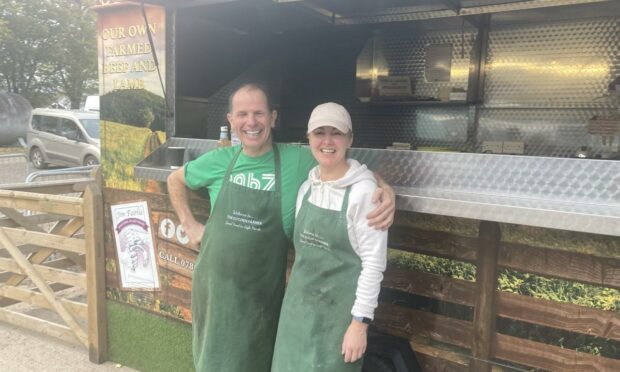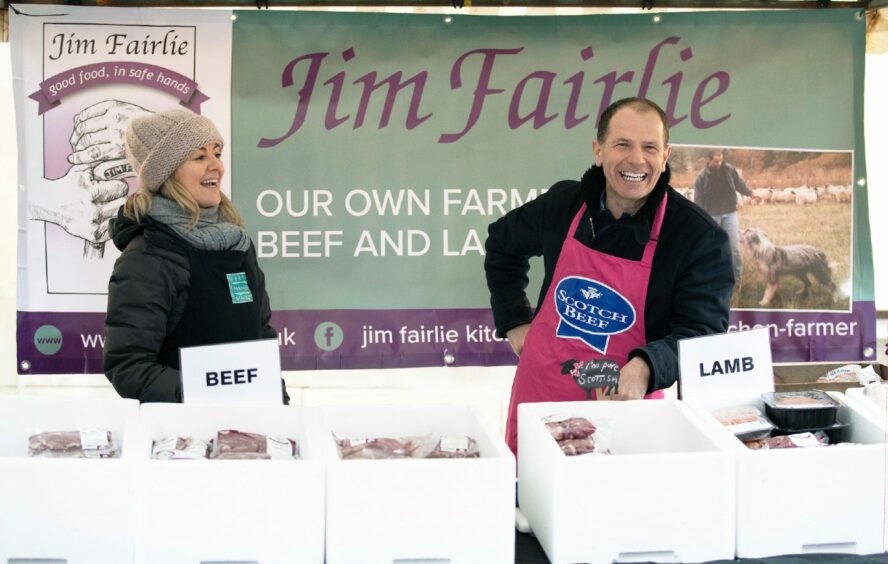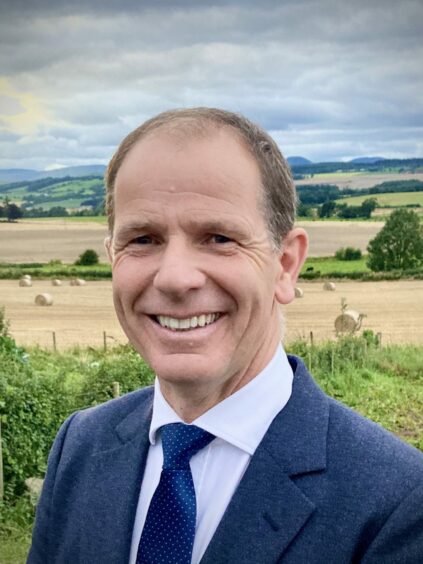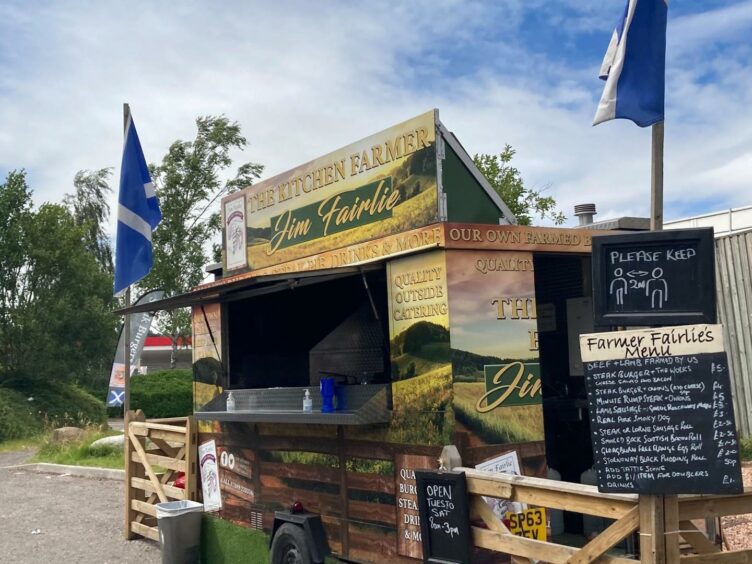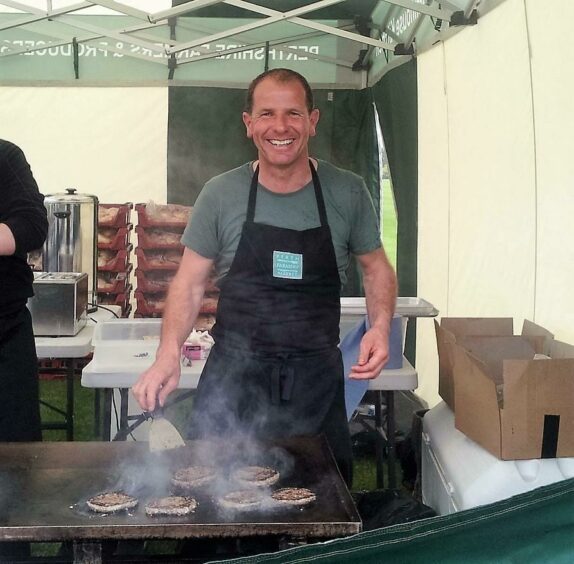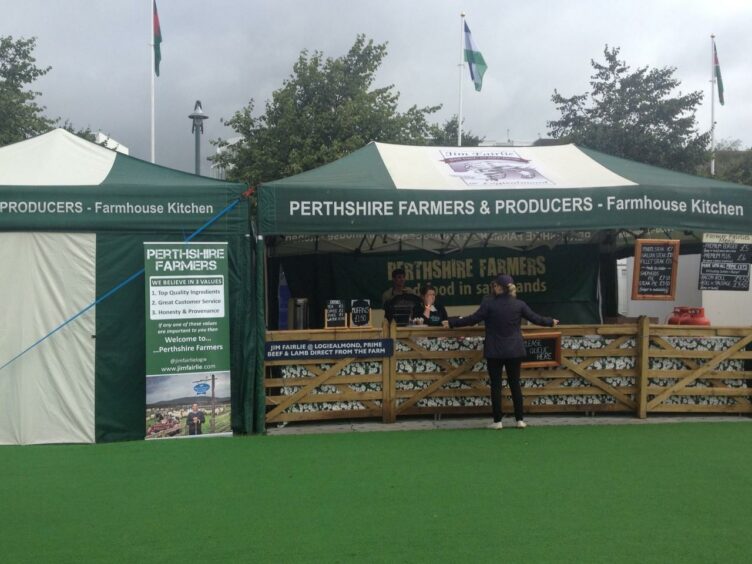Before becoming an MSP earlier this year, he was known as the man who brought the very first farmers’ market to Scotland and helped to change the relationship between farmers and their customers across the nation.
Now, having been elected to the Scottish Parliament for the seat of Perthshire South and Kinrosshire, MSP Jim Fairlie is winding down his food and drink business, which has been promoting Perthshire produce for 10 years.
Formed after a mix of the UK’s financial crash in 2007 and Jim’s love of music festivals, the idea for creating good-quality food was born.
Jim says: “I took over a hill farm in 2007 after starting the original farmers’ market in Perth in 1999 when I was shepherding.
“Then when the financial crash happened and our normal takings were going down in the farmers’ market, people were spending less money and we ended up putting a lot of really good-quality meat in the freezer.
“We were trying to find different ways to use up meat that we weren’t selling at the farmers’ market but years before that my wife had had the idea. I’d actually been to a U2 concert when I was in my 20s and halfway through the concert I went to get something to eat, and felt sick as a dog after I’d eaten it.
“It was really poor quality food. But when I got home my wife said ‘you’d think there’d be a market for good-quality food at these events’.
“That was years and years ago but it stuck and it was just there in the back of my mind.”
Runrig
Following his love for music festivals, it was a Runrig concert at Scone Palace in 2010 that saw the idea for Jim’s business Perthshire Farmers & Producers come to fruition.
He continues: “Then we had this beautiful frozen meat and we felt we needed to find somewhere to cook it and make something out of it.
“We were bouncing around all sorts of ideas then it was announced that Runrig were coming to Scone Palace. It was sort of odd because a friend of mine knew the Runrig team and I was trying to get into the Runrig concert while at the same time, Perth Farmers Market were doing something with the council.
“So, to cut a long story short, we ended up having a Perth Farmers Market marquee at the Runrig concert.
“We took the frozen meat that we had, defrosted it and myself and Graeme Pallister from 63 Tay Street in Perth minced all the meat down and we turned it into a really beautiful, handmade herby burgers and sausages.
“People loved it, there were huge queues and we were cooking it all there. From then we decided to set up a business called Perthshire Farmers & Producers.”
Elections
After being elected in May to the Scottish Parliament, Jim and his wife felt it wasn’t possible to continue with the business, and announced earlier this week that they were wrapping up its 10-year history.
“I’ve chosen now to wrap it up because I got elected to Parliament in May,” adds Jim. My wife, Anne, and I have run the business together for the last 10 years. There are certain areas that Anne deals with entirely on her own and certain areas that I deal with entirely on my own.
THAT’S A WRAP. For over ten years Anne and I have had the most amazing time meeting amazing people and having loads of fun at events and festivals all over Scotland, but today was our last. Huuuuuge thanks to all our customers and staff over the years who have been with us (1) pic.twitter.com/A01swOEhFn
— The Kitchen Farmer (@kitchen_farmer) October 23, 2021
“When I decided that I was going to put my hat in the ring for the Parliamentary seat, the idea was that we might carry it on with Anne doing it on her own and maybe taking somebody on to do all the stuff that I do, but she had some ideas but what other things she wanted to do.
“It’s just been a case of trying to juggle the parliamentary work, stuff that we’re doing domestically and winding down the business.
“Last Saturday was our last event and it was a great event – lovely people, a good event, really enjoyed it and I have to say there was one or two wee moments where we both went ‘this is it’ and it hit us.”
Changes
As he leaves the food and drink industry for pastures new The Kitchen Farmer, as Jim is sometimes known, is proud that he’s helped farmers connect with consumers and that the nation has more awareness of where their food comes from.
He adds: “In the main farming business I would say the biggest change is that farmers are probably more aware than they have been in a long time of their connection to the food and drink industry.
“That’s important – they need to know that they are part of the food and drink sector and what their role is in society. They help the country produce good-quality food.
“I don’t think we’re there yet and I think there’s still work to do. I think there’s a better cognizance now than there was in the past of a farmer’s role in being a food producer.
“When I started the farmers market, the farmers didn’t have a clue where their food went to, they didn’t have that connection between the food and drink sector around 25 years ago, and their job.
“I think that’s changing, though I would like to see it change more.”
Lasting legacy
In terms of a lasting legacy in the food and drink realm, the increase in farm shops, artisan producers and street food vendors has also not gone unnoticed.
“I’ve seen a huge lift in Scotland since the Farmers’ Market, in terms of the number of farm shops and artisan producers that have cropped up,” Jim says.
“Festival catering has also changed beyond all recognition. Music festivals were my thing when I was younger and it didn’t matter where you went, the food was basic and pretty poor quality.
“Now you can go to a festival and you’ll get artisan guys producing Thai food, prawns, shrimps, oysters, etc. Street food went to festivals before street food was a thing on the street.
“The other thing that has come about within the last 10-15 years has been food festivals. Now, you’re getting that connection and good-quality street food.
“We were doing burgers out of the burger van during lockdown but they weren’t just getting a burger – people were travelling miles and would pass about three other burger vans to come to us because they just wanted better quality.
“There is definitely a recognition from consumers that food doesn’t have to be poor quality and that better quality is available.”
